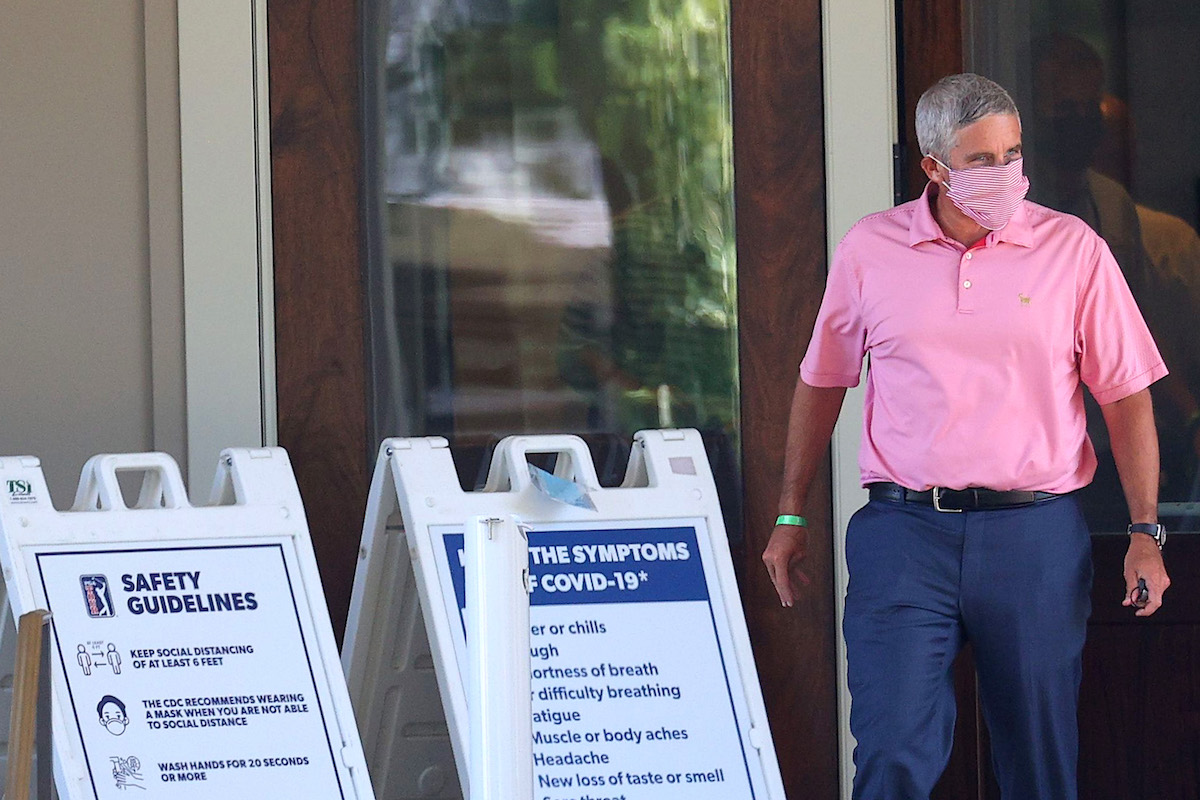
PGA Tour implores players to ‘do your part’ to counter coronavirus
Was Wednesday’s news from the Travelers Championship a pin prick or a gash in the PGA Tour’s “bubble”?
Only time will tell, but what is clear is that the PGA Tour has some mending to do on its health policies, and it’s unclear whether changes ultimately will be enough.
Commissioner Jay Monahan is committed to continuing the PGA Tour experiment that began two weeks ago in Fort Worth, Texas, at the Charles Schwab Challenge.
Unfortunately for Monahan, the first event back after the three-month interruption due to the pandemic would be in a state, Texas, that was in a severe uptick for the COVID-19 virus and continues to move in the wrong direction regarding infections.
The Tour then traveled to another virus hot spot in Hilton Head Island, S.C., where Justin Thomas voiced concerned about the “zoo”-like atmosphere of the vacation destination, which clearly lacked social distancing or mask wearing.
Now the Tour brings its road show to Connecticut.
Luckily for the Tour, the Travelers Championship was scheduled for this week. Connecticut joined neighboring New Jersey and New York early Wednesday in issuing a travel advisory for visitors from Alabama, Arkansas, Arizona, Florida, North Carolina, South Carolina, Texas, Utah and Washington. (Washington was removed from the list later in the day.)
The advisory, which took effect at midnight Wednesday, requires a 14-day quarantine to be enforced by the states’ health commissioners for any visitors from those states, which are experiencing elevated rates of infection.
Thus, any player, caddie or PGA Tour staff member at Hilton Head would not have been able to travel to Connecticut, and anyone who was home in one of the states in the advisory also would be affected.
During a hastily assembled news conference Wednesday at TPC River Highlands, Monahan outlined four additional measures to the Tour’s policy:
* Travelers on the Tour charter flight will be subject to the arrival testing procedures (nasal swab), in addition to the pre-charter test;
* Instructors have been added to the testing protocol in the Tour’s proposed “bubble”;
* The Tour will bring its fitness trailer onsite starting next week at Detroit Golf Club to eliminate players going to off-site facilities;
* The Tour stipend policy will not apply to any player not following the Tour’s safety protocols for COVID-19
But maybe the more impactful part of the memo to the players was what was written in highlighted text: We need you to do your part.
When asked whether players and others in the bubble were taking the protocols as seriously as were he and his staff, Monahan paused and sat back in his chair before answering, “Yes,” but he explained how easy it was to revert to old habits and routines.
“Over the first couple weeks, we've seen some instances where, let's say we've gotten a little bit lax or away from protocol,” Monahan said. “Full disclosure: I've done it myself, and I think that's the kind of tightening that we need to do in order to make sure we continue to be in a good position to move forward.”
It doesn’t get easier for the Tour with the potential ramifications of trips to Texas and South Carolina potentially showing up two weeks later. The next stops, in Michigan and Ohio, are in states that have suffered grievously during the first three months of the pandemic.
What would stop Michigan Gov. Gretchen Whitmer or counterpart Mike DeWine of Ohio from following the lead of the governors of Connecticut, New Jersey or New York and declaring mandatory quarantines?
On Wednesday health officials reported 323 newly confirmed cases in Michigan, the worst day in June, prompting Whitmer to delay Phase 5 of her reopening plan.
So, while the PGA Tour is addressing issues with its protocols and how those inside and outside the bubble are acting, they might be caught flat-footed by a state official looking out for residents’ interests.
The PGA Tour has performed 2,757 in-market tournament tests in the three weeks since the season restart, with seven positives. That .0025 percentage is far below the U.S. average of 8.3 percent of positives among all tests given, but Monahan knows one positive test is too many.
If the PGA Tour is going to continue play, then the organization will have to deal with more positive tests. The virus is not going away any time soon. As Monahan said, “We need to remind ourselves that we're all learning to live with this virus, and we all need to learn to live with this virus, both as individuals, as family members and certainly within our businesses.”
So, how many positive tests will be enough before the Tour pulls the plug? It’s a question that Monahan was unwilling to answer.
Ultimately, the PGA Tour believes it is offering a bit of salvation to sports fans starved for live action as so many other leagues struggle to resume play. The Tour might be right, but if too many players or caddies act irresponsibly, professional golf might have to take another hiatus. If so, the next reopening might not be before a vaccine is in widespread use, which most experts say won’t be before mid-2021.
Monahan is putting the health of the Tour squarely in the players’ corner, even if he was unwilling to say it.
Hopefully, they are listening.
Sign up to receive the Morning Read newsletter, along with Where To Golf Next and The Equipment Insider.